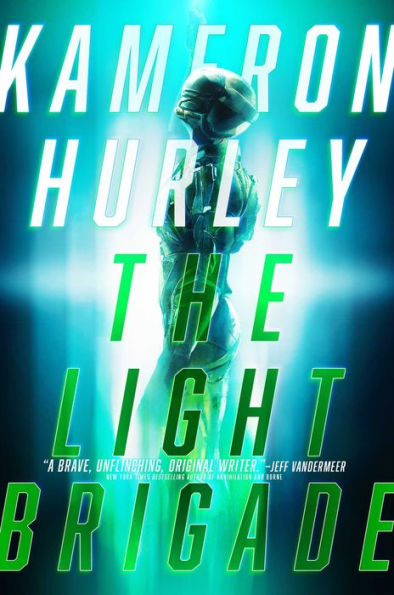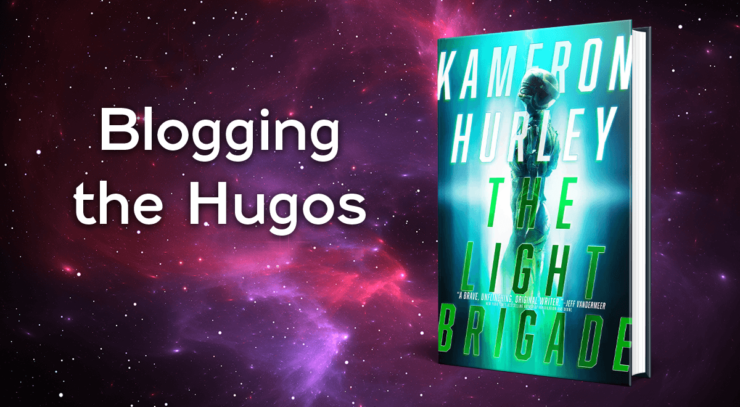In the lead-up to the 2020 Hugo Awards, we’re taking time to appreciate this year’s best novel Finalists, and what makes each of them great.
Like everything else in 2020, genre fiction has become heavily politicized. I don’t mean that in the way people sometimes mean it—people who complain that they don’t want “politics” in their books and only care about “good stories.” It’s more that increasingly, the type of novel you choose to read is seen by some as a political choice, irrespective of its contents: If it’s from this publisher, it’s leftist nonsense. If it’s from that publisher, it’s a right-wing polemic. And at a time when the font choice on a book’s cover is as declarative as an American flag sticker on a Facebook profile photo, no SFF subgenre feels more fraught to me than military science fiction.
It wasn’t always like this. The two most famous milSF novels ever written are Robert Heinlein’s Starship Troopers and Joe Haldeman’s The Forever War, books miles apart politically and philosophically, yet both still very much playing around in the same toy box. And yet, though there are certainly exceptions to the rule—milSF foregrounding complex women as protagonists, milSF with queer characters—the five years I spent editing a science fiction blog led me to observe that to the majority of modern readers, milSF is synonymous with conservatism and militarism. Certainly my own tastes tend to lean away from the tropes that drive many of these books—broadly speaking: combat, military hierarchy, and a proclivity to explain technology and weaponry to a degree I find uninteresting.
But one of the things I love about reading genre is seeing how many different books can be built with the same basic tools, and Kameron Hurley’s The Light Brigade is an excellent case in point. This is a book that revels in pretty much all of the tropes I just said I don’t like, but it deploys them in a way that speaks to me, and loudly. I only read it, initially, because I like the author a great deal. Kameron Hurley has written a feminist space opera that grossed me out even as it pulled me in to a story of weird worldbuilding and body horror (The Stars Are Legion); a science fantasy filled with bugs and blood, irredeemable characters and unforgettable violence (God’s War); an epic fantasy with too many characters and too many worlds for me to keep straight (The Mirror Empire). None of them are books that strictly sound like something I would like, but I liked them all, messy and mad as they are. Moreover, I could sense that Hurley had a truly fantastic novel in her somewhere, a book that would fulfill the promise of the bits and pieces I found to admire in all the others. And, fittingly enough considering it’s the one that finally landed her name on the Best Novel Hugo ballot, The Light Brigade is it.
Buy the Book


The Light Brigade
Built on the bones of a short story of the same name originally published in Lightspeed, the novel follows in the footsteps of Heinlein and Haldeman, its two most obvious influences, but it is much more than a pastiche or an homage. Like Starship Troopers, it chronicles the vicious battles in an extraterrestrial military conflict, playing out in a future shaped by a tragedy that cost the lives of millions on Earth, and in which military service has become the shortest path to citizenship and a better life for those too poor to avoid the fight. In contrast to Heinlein’s seminal novel, Hurley’s enemy isn’t a mindless, insectile Other but us, because isn’t it far more likely we’re going to wipe each other out long before aliens wander past to do it for us?
The Light Brigade follows a soldier who is part of a squadron of ground-level grunts who are regularly broken down into light waves and beamed across space to fight in battles on Mars. Before signing on, Dietz was a nobody—a non-citizen “ghoul” who witnessed her father brutalized for the crime of trying to provide for his family in a world nominally controlled by governments but actually subservient to massive, all-powerful corporations. Dietz doesn’t love the military, but she desperately wants a better life—and after her home city of São Paulo is destroyed in an attack by Martian separatists, she figures fighting a war on another planet is her best shot at one.
After she endures her requisite hellish boot camp experience, Dietz is assigned to the Light Brigade, despite her intel profile indicating she might not be the best candidate; no matter, the corporate warmasters need warm bodies, and most grunts don’t survive very long anyway. And though most soldiers seem to endure being broken down into light waves and blasted through space just fine, Dietz unfortunately finds she’s one of the special ones—the ones the military doesn’t want to admit exist. Because it quickly becomes apparent the process isn’t just moving her through space but through time as well—unpredictably and uncontrollably. She begins to experience the war out of order, launching into one mission and arriving into the thick of another, seeing her fellow soldiers cut down in battle and then alive when she beams back to base. She’s not sure if she’s losing her mind, or is the unwitting party to some vast conspiracy, or both. All she knows is that her glimpses of the future are telling her the war is going to go very poorly for humanity, and that there seems to be a point beyond which not even her inexplicable temporal travels can take her.
This novel is a marvel of structure; the author has discussed consulting with a straight-up mathematician to make sure she graphed and charted her intercutting timelines precisely. As Dietz ping-pongs around in time and from one brutal, gory sequence of military action to the next, she never knows more about what’s happening to her than we do, giving the book the quality of a puzzle box mystery stuffed inside a repeatedly exploding grenade. It’s enormously confusing, but necessarily so, as being lost along the way is part of the experience; I can recall few books that snap together with such satisfying, logical precision and manage to do so without telegraphing any of their Big Reveals (and The Light Brigade has more than one).
It’s also a pretty compelling character study; though all but a few of Dietz’s squadmates die before we get to know them too well, she is well-shaded and complex, a damaged soul defined by her anger. Her increasing disillusionment with the fight, coupled with her temporal displacement, recalls the plight of the soldiers in Haldeman’s The Forever War, in which the conflict mutates and changes in the time-displaced decades it takes grunts to make it to the front lines, though they must fight ever on regardless. Certainly Dietz has plenty to be angry about—her world is an ugly place for those unlucky enough to be born into it anything but the elite classes, run by corporations and governments that have conglomerated into a gaping black hole that hungers only to suck in more and to grow larger at any cost. With the authority of nation-states, the opposing corporations and their shrewd CEOs continue a fight they know can lead to only one possible, mutually assured ending only because the system they exist within won’t allow them to stop. If either side stops, the war machine stops, and you can’t stop perpetual motion.
This is an angry book, in fact, and a fitting one for our time. There’s plenty to be angry about in our present world, whichever side of the political divide you fall on—and plenty of evidence to suggest that the sides are an illusion anyway. The conflict exists only to perpetuate the system, and the system exists only to perpetuate itself. It is not a comforting book, but it is not a hopeless one, either—in all her many grinding missions, Dietz does glimpse a chance at freedom. The possibility of escape. The possibility to build something new, and better, and more just. Brighter. Wouldn’t we all like to do as much?
Joel Cunningham was the founding editor of the B&N Sci-Fi & Fantasy Blog (RIP), where he explored the galaxy for 5 years, picking up a Hugo Award (well, tangentially) along the way. He’s now managing editor of Lifehacker, which means he’s managing at least one thing nowadays. He lives in an apartment in Brooklyn with his wife and two children and hopes to go outside again someday. He tweets @joelevard.











This was a good book.
On my second read-through I noticed that Dietz and her squadmates got six weeks of basic training, then got tossed into the meat-grinder. Later she finds that training has been reduced to three weeks.
There didn’t seem to be any advanced training, either. Additional training costs money. Just throw bodies at the problem. The ones who survive will learn on the job, I guess.
This review uses the pronoun “she” fairly casually here, considering that for 95% of the book, the protagonist’s gender is deliberately hidden. (There are only a few places where the narrative gets distorted to do this, but if you’re looking for it then they become obvious.)
@2 I thought about that as I was writing it but trying to obfuscate the gender of the protagonist is pretty difficult. I considered using “they” pronouns but that’s not really accurate, and if I’d pointed out that I was using a gender neutral pronoun to avoid identifying the gender of the main character, that would have drawn more attention to it.